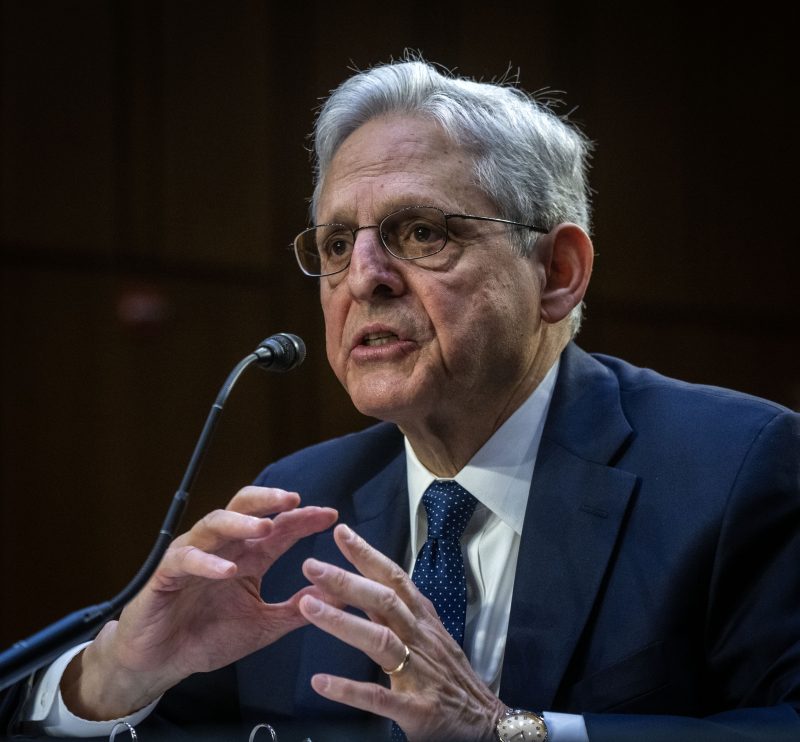Attorney General Merrick Garland’s handling of special counsel John Durham’s report Monday differed starkly from that of his predecessor, William P. Barr, who was criticized in 2019 by former federal law enforcement officials and Democrats for his handling of a final report from then-special counsel Robert S. Mueller III.
The long-awaited report from Durham moved far faster from Garland’s desk to Congress — and the public — than Mueller’s report did four years earlier.
At the time, officials said the delay was because redactions had to be made to Mueller’s 448-page report, largely to remove information about ongoing investigations or prosecutions. The 306-page Durham report was written differently, as an unclassified document with a 29-page classified appendix that has not been made public. And there are no known ongoing investigations from Durham’s work.
A former U.S. Attorney from Connecticut, Durham was asked to examine whether anyone at the FBI violated laws while investigating the 2016 Trump campaign — essentially an investigation of the probe that Mueller inherited in 2017.
Durham’s conclusions did not break any major new ground, mostly taking an even harsher view of law enforcement conduct that the Justice Department inspector general had strongly criticized in 2019.
Nor did Durham’s investigation find sizable criminal culpability. The two cases he brought to trial ended in acquittals. One former FBI lawyer agreed to plead guilty to a charge that carried no jail time.
The end of Durham’s special counsel assignment — almost four years to the day after he was appointed by Barr — drew immediate comparisons to the fractious finale of Mueller’s work.
After receiving Mueller’s report in the spring of 2019, Barr issued a brief memo describing its principal conclusions, but it took weeks for the bulk of Mueller’s actual findings to become public. In the meantime, Trump publicly declared victory, Mueller privately complained to Barr that his memo lacked context, and when the Mueller report was finally released and Mueller’s complaints became known, Barr faced a fresh round of criticism for his handling of the issue.
Garland received the Durham report on Friday and sent it to congressional leaders on Monday, shortly before the entire document was shared with reporters and posted online. He did not offer his own analysis or summary.
“The difference in the rollout was stark,” said Mary McCord, who served as acting assistant attorney general for national security during President Barack Obama’s administration. “Garland did what he said he would do when he maintained the special counsel appointment of Durham. He let him continue his work independent of the department.”
By contrast, she said, Barr’s memo “was a deceit on the American people.”
Anthony Coley, a former Justice Department spokesman for Garland, said the attorney general “played it by the book — minimum redactions, quick release of the total report — and left the public to draw its own conclusion. That’s how it should be done.”
Garland faced a challenge of “landing Barr’s plane — this politically motivated investigation that was meant to appease a sitting president — and to do so in a way that didn’t further politicize the department,” Coley said.
Barr did not immediately return a call seeking comment. A Justice Department spokeswoman declined to comment.
While Democrats were quick to dismiss the Durham report, noting the lack of new revelations, Republicans seized on it in an effort to make the case for additional disclosures about FBI investigations related to President Biden’s family.
Sen. Charles E. Grassley (R-Iowa) said in a written statement that the report “validates the concerns I’ve raised since we first learned of the bogus investigation in 2017. The FBI allowed itself to be hijacked and weaponized by political actors to target a political rival during a presidential election and administration. Restoring its integrity, if that’s even possible, will take humility, transparency and accountability.”
The FBI said in a statement that it had already implemented “dozens of corrective actions, which have now been in place for some time. Had those reforms been in place in 2016, the missteps identified in the report could have been prevented. This report reinforces the importance of ensuring the FBI continues to do its work with the rigor, objectivity, and professionalism the American people deserve and rightly expect.”
Frank Figliuzzi, a former FBI assistant director for counterintelligence, called the Durham investigation a failure, but said he expects Republicans to use snippets of the report to claim victory and portray the FBI negatively.
“If the goal was those multiple indictments, he failed miserably,” Figliuzzi said, alluding to past predictions by Trump that the probe would uncover significant crimes. “The consolation seems to be sound bites in a political product for Fox News.”
Partisan fights over how the Justice Department investigates politicians are nothing new. But the stakes have grown significantly in recent years, as prosecutors and agents have conducted high-profile inquiries into presidential candidates, from Hillary Clinton to Trump to Biden.
In 2019, Barr revealed that Mueller did not find a conspiracy between the Trump campaign and Russian officials seeking to interfere with the 2016 presidential election. Barr also said that Mueller had not reached a conclusion about whether Trump had tried to obstruct justice, but that Barr reviewed the evidence and determined it was insufficient to support such a charge. That determination, in particular, rankled Democrats, who viewed it as prejudging a question that Mueller may have meant for Congress to consider.
Days after Barr’s memo was released, Mueller wrote to the attorney general, complaining that the memo “did not fully capture the context, nature, and substance” of his team’s work.
The letter urged Barr to quickly release the 448-page report’s introductions and executive summaries, and made initial suggested redactions for doing so.
Republican lawmakers are seeking to have Durham testify about his findings, perhaps next week. So far, there does not seem to be the kind of tension that marked the previous special counsel report. In a letter sent to Garland on Friday along with the report, Durham thanked the attorney general for “permitting our inquiry to proceed independently.”



























